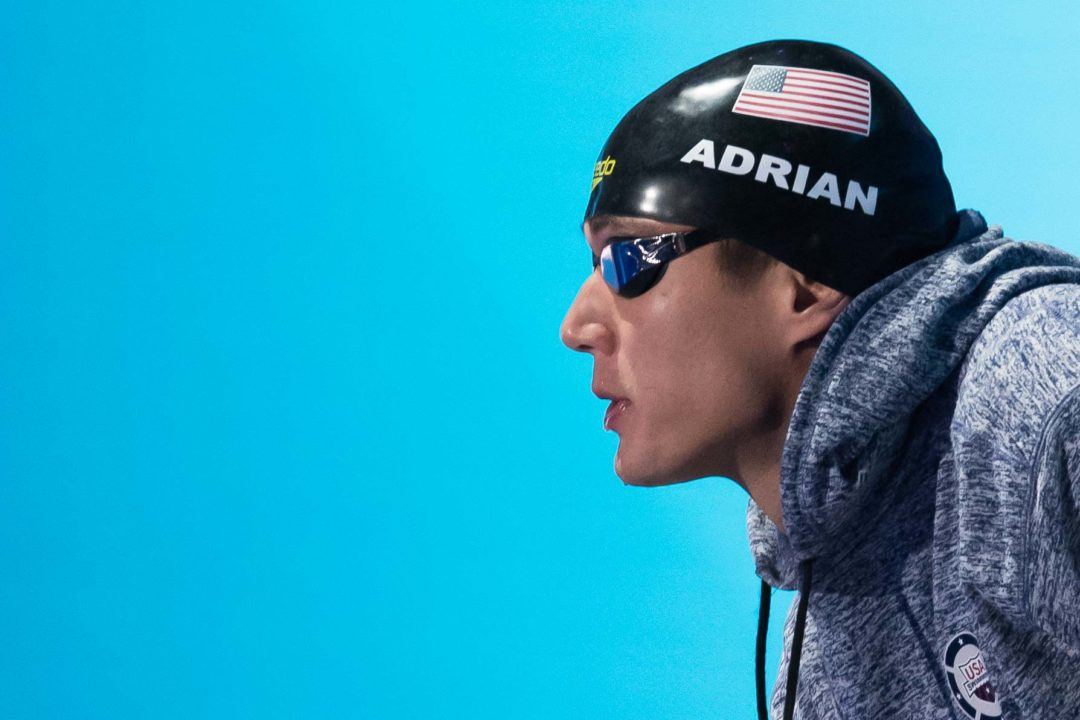by Olivier Poirier-Leroy. You can join his weekly motivational newsletter for competitive swimmers by clicking here.
Mental toughness isn’t just about being more gritty than the next swimmer; it’s about taking care of yourself between practices. Here’s how sleep will help you be more resilient this season.
The life of a competitive swimmer can be grueling. You don’t really need me to tell you that. Between the early morning workouts, the in-season meets, and a season that stretches across every month on the calendar, we put a lot of time and energy into the sport.
As a result of all the millions and millions of swim practices, and all of the competing interests for our time—school, eating, what passes for a social life, more eating—our schedule becomes taxed to the point that we start looking for things to cut corners on.
Unfortunately, sleep is usually the first thing on the cutting block.
Your coach has told you a hundred times how important it is. So have your parents. And so have I.
When you think of what mental toughness is, there are probably a host of different examples that come to mind. It’s being able to show up on those early mornings when you are sore and tired. It’s finishing the main set at full throttle even though your lungs and muscles are screaming for oxygen. It’s doing the little things right, even when you don’t feel like doing them.
Mental toughness, essentially, is the ability to withstand stress.
The approach we take when it comes to “toughening up” usually goes against how mental toughness works, however. We go balls-to-the-wall all the time, never giving ourselves a chance to recover and rejuvenate. Or we treat our bodies like a five-alarm dumpster fire between practices, ensuring that we never have a chance to properly bounce back.
The sneaky reality of mental toughness is buried in how we well we recharge and recover. It’s looking after ourselves physically and mentally so that we can “top up” our toughness for moments where we need it most.
Mental Toughness Comes from Proper Recovery
Some swimmers naturally come by exceptional levels of resilience. There’s no arguing that point. There are athletes among us have a better developed approach to mental toughness.
But mental toughness is not something that is static or even entirely genetic. It’s a skill, something that we can crank up when we give it a little bit of TLC.
And one of the easiest (and most enjoyable) ways to secure yourself some hot-blooded mental toughness is spending more time in the sheets.
Lack of Sleep Makes Your Workouts Harder Than They Need to Be
Think back to the last time you went back-to-back sleepless nights: how did thoseworkouts go?
Sleep deprivation causes things to feel harder than they should. When we experience sleeplessness the next day our rate of perceived effort goes up—even off just one night of bad sleep, meaning that the hard workout planned is going to feel even harder.
Sleep deprivation causes our ability to pay attention to plummet. Ever notice that it gets harder to focus on things when you are tired? Things like the interval, the breathing pattern, or even keeping track of how many rounds of the main set you’ve done?
Sleep deprivation causes us to be sicker more often. Unsurprisingly, when we subject ourselves to sleep loss we put our bodies at risk of being sick. Research has consistently shown a connection between poor sleep and bad health outcomes (here’s one), which should make intuitive sense: how many times have you gotten sick when your schedule was over-burdened?
Sleep deprivation makes us less tough. One study found that teenagers who had higher levels of mental toughness slept better, slept longer and more deeply, and woke up less often compared to their groggy and less mentally tough peers.
The Next Step
Getting more sleep usually means that you are going to have cut corners elsewhere.
Perhaps they are going to be things that you think you need (Netflix, chatting on your phone till the wee hours of the morning, scrolling social feeds like the wheel on Wheel of Fortune). Perhaps it means you need to get serious about your schedule. (Here are some more ideas on how to carve out time for more sleep.)
Write yourself out a sleep schedule. Get some naps in. Spend more quality time with your pillows.
Higher levels of mental toughness and better and faster swimming await.
ABOUT OLIVIER POIRIER-LEROY
Olivier Poirier-Leroy is a former national level swimmer. He’s the publisher of YourSwimBook, a ten-month log book for competitive swimmers.
 He’s also the author of the recently published mental training workbook for competitive swimmers, Conquer the Pool: The Swimmer’s Ultimate Guide to a High Performance Mindset.
He’s also the author of the recently published mental training workbook for competitive swimmers, Conquer the Pool: The Swimmer’s Ultimate Guide to a High Performance Mindset.
It combines sport psychology research, worksheets, and anecdotes and examples of Olympians past and present to give swimmers everything they need to conquer the mental side of the sport.
Ready to take your mindset to the next level?
Click here to learn more about Conquer the Pool.
COACHES & CLUBS: Yuppers–we do team orders of “Conquer the Pool” which includes a team discount as well as complimentary branding (your club logo on the cover of the book) at no additional charge.
Want more details? Click here for a free estimate on a team order of CTP.
